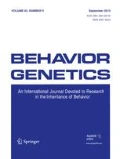Abstract
Follow-up of 73 patients withTurner's syndrome (XO) seen since 1953 disclosed the presence of a remarkable “inertia of emotional arousal” in the majority. All patients developed a feminine psychosexual identity. Nine of 28 adult patients were married, and two had adopted children. It is not known whether the emotional inertia is a secondary or a direct consequence of the chromosomal abnormality.
Résumé
D'après des discussions répétées depuis 1953 avec 73 sujets atteintes deSyndrome Turner (XO), une remarquable absence d'excitation émotionnelle fut observée. Toutes ont developpié une orientation psychosexuelle féminine. Neuf parmi les 28 adultes se sont mariées et deux d'entre elles ont adopté des enfants. I1 est impossible de déterminer si cette inertie émotionnelle est un resultat secondaire ou la conséquence directe de l'absence du chromosome.
Zusammenfassung
Die wiederholte Untersuchung von 73Turner Syndrome (XO) Patienten zeigte eine auffällige Abwesentheit auf von emotioneller Aufregbarkeit. Fast alle Patienten hatten eine weibliche psychosexuelle Einstellung. Neun der 28 Erwachsenen waren verheiratet und zwei hatten Kinder adoptiert. Es ist unmöglich fest zu stellen ob die emotionelle Unterreaktität eine sekundäre oder direkte Folge der Chromosomabnormalität ist.
Similar content being viewed by others
References
Alexander, D., Ehrhardt, A. A. and Money, J. (1966). Defective figure drawing, geometric and human, in Turner's syndrome.The Journal of Nervous and Mental Disease,142, 161–67.
Alexander, D. and Money, J., (1966). Turner's syndrome and Gerstmann's syndrome: neuropsychologic comparison. Neuropsychologia,4, 265–73.
Bayer, L. M. and Bayley, N., (1959).Growth Diagnosis. University of Chicago Press, Chicago.
Drash, P. W., Greenberg, N. and Money, J., (1968). Intelligence and personality in four syndromes of dwarfism. Chapter 39 inHuman Growth: Body Composition, Cell Growth, Energy and Intelligence (D. B. Cheek, ed.). Lea and Febiger, Philadelphia.
Gardner, L. I. (Ed.)., (1969).Endocrine and Genetic Disease of Childhood. W. B. Saunders, Philadelphia.
Ehrhardt, A. A., (1969). Zur Wirkung foetaler Hormone auf Intelligenz und geschlechtsspezifishes Verhalten. (The effect of fetal hormones on intelligence and gender identity). Inaugural-Dissertation zur Erlangung des Doktorgrades der Philosophischen Fakultaet der Universitaet Duesseldorf.
Hampson, J. L., Hampson, J. G. and Money, J., (1955). The syndrome of gonadal agenesis (ovarian agenesis) and male chromosomal pattern in girls and women: Psychologic studies.Bulletin of The Johns Hopkins Hospital,97, 207–26.
Harris, G. W., (1964). Sex hormones, brain development and brain function.Endocrinology,75, 627–48.
Johnson, A. J., Brasel, J., and Blizzard, R. M., (1969). Growth in patients with gonadal dysgenesis receiving fluoxymesterone.Journal of Pediatrics,75, 1015–21.
Jost, A., (1961). The role of fetal hormones in prenatal development.The Harvey Lectures, Series55, 201–26. Academic Press, New York.
Money, J., (1964). Two cytogenetic syndromes: Psychologic comparisons. I Intelligence and specific-factor quotients.Journal of Psychiatric Research,2, 223–31.
Money, J., (1965). Influence of hormones on sexual behavior. InAnnual Review of Medicine, Vol. 16 (A. C. Degraff, ed.). Annual Reviews, Inc., Palo Alto, 67–82.
Money, J. and Pollitt, E., (1966). Studies in the psychology of dwarfism: II. Personality maturation and response to growth hormone treatment.Journal of Pediatrics,68, 381–90.
Neumann, F., Steinbeck, H. and Hahn, J. D. Hormones and brain differentiation, in press.
Sabbath, J. C., Morris, T. A., Menzer-Benaron, D. and Sturgis, S. H., (1961). Psychiatric observations in adolescent girls lacking ovarian function.Psychosomatic Medicine,23, 224–31.
Shaffer, J. W., (1962). A specific cognitive deficit observed in gonadal aplasia (Turner's syndrome).Journal of Clinical Psychology,18, 403–6.
Shaffer, J. W., (1963). Masculinity-femininity and other personality traits in gonadal aplasia (Turner's syndrome). InAdvances in Sex Research (H. G. Beigel, ed.). Hoeber, New York.
Wilkins, L., (1965).The Diagnosis and Treatment of Endocrine Disorders in Childhood and Adolescence. Third Edition. Charles C. Thomas, Springfield, Ill.
Author information
Authors and Affiliations
Additional information
Supported in Research by Research Career Development Award No. 5K3-HD-18635 and Grant No. HD-00325, U.S.P.H.S.
Rights and permissions
About this article
Cite this article
Money, J., Mittenthal, S. Lack of personality pathology in Turner's syndrome: Relation to cytogenetics, hormones and physique. Behav Genet 1, 43–56 (1970). https://doi.org/10.1007/BF01067370
Issue Date:
DOI: https://doi.org/10.1007/BF01067370




